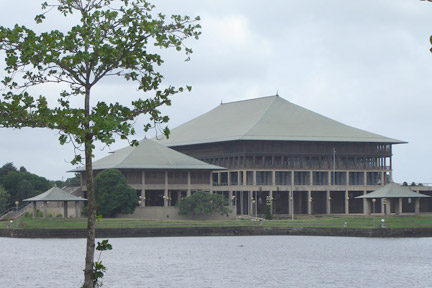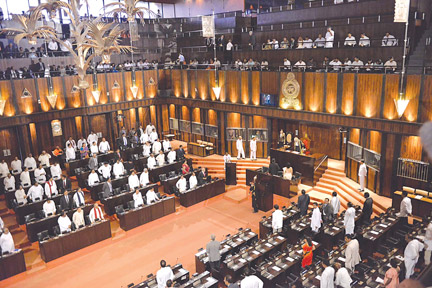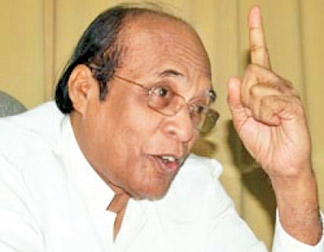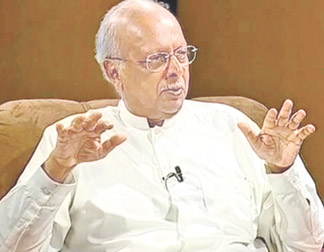Laying the foundation for the 3rd Republican Constitution
A Constitution is meant to control those in power. It
shouldn't be the people in power writing it - Rohan Edirisinha
by Rukshana Rizwie
 Starting
this week, the government will lay the foundation for what would be Sri
Lanka's third Republican Constitution. This Constitution as Dr. Nihal
Jayawickrama, Sri Lanka's former Secretary of Justice rightfully pointed
out is "A document that crystallises a 'consensus' among the citizens as
to the nature and character of their State and the manner of its
governance." Starting
this week, the government will lay the foundation for what would be Sri
Lanka's third Republican Constitution. This Constitution as Dr. Nihal
Jayawickrama, Sri Lanka's former Secretary of Justice rightfully pointed
out is "A document that crystallises a 'consensus' among the citizens as
to the nature and character of their State and the manner of its
governance."
Do we need a new constitution?
Prime Minister Ranil Wickremesinghe outlined the need for a new
Constitution, saying the devolution of power, electoral reform and the
replacement of the Executive Presidential system would be three key
areas for those drafting the new Constitution.
The objective is to quell rising ethnic tension and advance national
reconciliation.
"We cannot and we should not miss this opportunity," the Prime
Minister emphasised during the Sujatha Jayewardene Memorial Oration
where his keynote address was on the need for a new Constitution.
Formulating a new constitution was also one of the promises made to
the UN Human Rights Council last year. A strongly-worded statement
delivered by Minister of Foreign Affairs, Mangala Samaraweera, in Geneva
scored political points, eliciting a softer stance from the Council.
Where the human rights issue is concerned, the Minister said a political
solution to the ethnic conflict will be sought through a new
constitution.
A Constitutional Assembly
"The best guarantee for a non-recurrence of ethnic tension, is a
political settlement that addresses the grievances of the Tamils. We
hope we can achieve by adopting a new constitution. A Constitutional
Assembly will be set up for this purpose shortly," he said.
The Office of the High Commissioner of the Human Rights Commission is
expected to "present an oral update" to the Council at the 32nd session
in June this year and a "comprehensive report followed by discussion to
implement the present Resolution at its 34th session" in March 2017.
 Sri
Lanka's 1978 Constitution is believed to be woefully inadequate and
cumbersome for a modern democracy such as the one led by President
Maithripala Sirisena. Both Constitutions of 1972 and 1978 were widely
criticized for failing to resolve the grievances of the minority
communities, including their basic rights, religion and language. Sri
Lanka's 1978 Constitution is believed to be woefully inadequate and
cumbersome for a modern democracy such as the one led by President
Maithripala Sirisena. Both Constitutions of 1972 and 1978 were widely
criticized for failing to resolve the grievances of the minority
communities, including their basic rights, religion and language.
It is well-known that the past two constitutions were enacted by
political parties and the 1978 Constitution was made to serve the
interests of the one-time President J.R. Jayewardene.
Prof. Lakshman Marasinghe, Chairman of the Law Commission, an expert
on Constitutional Reform told the Sunday Observer, while the 1972
Constitution was democratic and established the supremacy of the
legislature, the 1978 Constitution established the supremacy of the
Executive Presidency.
"Under the supremacy of Parliament, the 1972 Constitution restricted
the liberties of people. By incorporating national security laws into
the 1978 Constitution, a deadly blow was dealt to the liberties of
people. It was through this formula - making national security laws part
and parcel of the Constitution - that J.R. Jayewardene attacked trade
unions, political parties and the minorities.
Wield power
"The Executive President thus 'enforced' disappearances under
Emergency Laws. Blatant abuse of State property, under the Mahinda
Rajapaksa regime, was possible due to the 1978 Constitution," the Asian
Human Rights Commission noted in a statement.
Both constitutions served the interests of political groups in the
South and the voices of the North went unheard. Dr Siri Gamage, a senior
lecturer in Contextual Studies at the University of New England opined
that even after Independence, the political and party system encouraged
a high degree of elitism permitting a select group of urbane and
wealthy, Westernised families to wield power.
The new political culture created by changing the coterie of
politicians, he says made them feel they were above law. They dealt with
the public as those who should be controlled rather than to be listened
to - a typical colonial attitude.
Questions are being floated in the legal fraternity over the
legitimacy of a new Constitution by converting Parliament into a
Constitutional Assembly. It is understood that the making of a new
constitution is the sole prerogative of the public.
In 1972, the Centre-Left Coalition Government, headed by Sirimavo
Bandaranaike had in its Election Manifesto included the setting up of a
Constitutional Assembly to draft a new Constitution through national
consensus.
By voting that government into power, the citizens of Sri Lanka gave
their approval to set up the constitutional Assembly which gave the
mandate for the Republican Constitution.
"Shouldn't we go for a Referendum before going in a
constitution-making process and thereafter refer it to the public,"
asked Prof. Marasinghe. He explained that Parliament under Article 83
had to pass a Resolution to transform into a Constitutional Assembly.
However that Resolution should be decided on at a Referendum and with a
majority consent; then Parliament has received the approval from the
people.
According to the 1978 constitution, under Article 75b, Parliament is
bestowed with the legislative authority to formulate a constitution.
"However, this doesn't give Parliament the authority to reconstitute
itself into a Parliamentary Assembly," he said. Parliament, under
Article 83 can go for a Referendum and under 120b, if the draft
constitution is passed by Parliament with a 2/3 majority, it cannot be
challenged in its entirety.
Forty years ago the case which saved the Indian democracy, thanks to
Shri Kesavananda Bharati, an eminent jurist Nanabhoy Palkhivala and the
seven judges who were in the majority.
In 1971, Indira Gandhi attempted to empower the Indian Parliament to
amend any part of the Constitution. However, the Supreme Court ruled
that such amendments could not destroy the 'basic structure' of the
Constitution. Fundamental rights were a part of the 'basic structure'.
The Indian Supreme Court prevented her from doing so, stating that
the elected legislature only had legislative power and the making of
Constitutions did not fall within that power as that power belonged to
the people.
"The case stems from the simple fact that the basic doctrine cannot
be amended by the legislature," Prof Marasinghe said. "If a new
Constitution is to be introduced in Sri Lanka, what is the basic
structure of the Sri Lankan Constitution?"
The Prime Minister has set March31 this year as the deadline for
public consultations which would deliberate on the key facets of the
draft constitution, through the sub-committee which will handle the
subject.
We favour select committee not constitutional assembly -
D.E.W.Gunasekara
 Communist
Party Leader D.E.W.Gunasekara said, "We are not in favour of a
Constitutional Assembly but a of Select Committee. We have no objections
to formulating a new Constitution. We have our reservations about their
modus operandi and as to how they are going to make it. We should be
satisfied with the parliamentary system and it is not necessary to bring
a Resolution and transform Parliament into a Constitutional Assembly.
Parliament can perform that function. Communist
Party Leader D.E.W.Gunasekara said, "We are not in favour of a
Constitutional Assembly but a of Select Committee. We have no objections
to formulating a new Constitution. We have our reservations about their
modus operandi and as to how they are going to make it. We should be
satisfied with the parliamentary system and it is not necessary to bring
a Resolution and transform Parliament into a Constitutional Assembly.
Parliament can perform that function.
"We met President Maithripala Sirisena on January 7 and drew his
attention to this. Why are they bringing a Resolution to transform
Parliament into a Constitutional Assembly? We can do it within the
framework of Parliament. Another body is not needed to form a
constitution."
"Here normal Parliamentary functions and every other thing is
recorded in the Hansard and the Speaker is also present. The
Constitutional Assembly doesn't have a Speaker and it has only some
Chairs. We don't need to deviate from Parliament. In 1972, the need was
there to draft a new Constitution because the 1946 Constitution was
imposed on us by the British Parliament. We had to go for a new
Parliament as executive anarchy was there. Even if we attempted to bring
in a new Constitution at that time, there was a possibility that they
would put a stop to that. That is why a decision was taken to transform
Parliament into a Constituent Assembly and that was necessary at that
stage, because the Queen was our Head of State. Today, we are a
sovereign republic so that question doesn't arise and Parliament can
continue its function."
Inclusive committee of parliament - the need - Prof. Tissa
Vitharana
 Lanka
Sama Samaja Party Leader Prof. Tissa Vitharana said the procedure that
is now being adopted is not based on Standing Orders of Parliament but
one determined by the Prime Minister as the Head of the Cabinet. He is
directing operations to make use of not only Parliament but an external
mechanism as well. For instance, the committee that has been set up to
seek the views of the public as well as other political parties, does
not directly interact with the Members of Parliament. There is a
separate committee set up by the Prime Minister as the Head of the
Steering Committee and consists of people, even outside Parliament. Lanka
Sama Samaja Party Leader Prof. Tissa Vitharana said the procedure that
is now being adopted is not based on Standing Orders of Parliament but
one determined by the Prime Minister as the Head of the Cabinet. He is
directing operations to make use of not only Parliament but an external
mechanism as well. For instance, the committee that has been set up to
seek the views of the public as well as other political parties, does
not directly interact with the Members of Parliament. There is a
separate committee set up by the Prime Minister as the Head of the
Steering Committee and consists of people, even outside Parliament.
What is necessary is a Select Committee, besides representatives
elected by the people in Parliament and representatives of political
parties not represented in Parliament and representatives of civil
society groups.
This can be done through a Select Committee. But unlike a normal
Select Committee which is limited in number, here we need to have a
committee which includes all Members of Parliament. You can't call it a
Select Committee and it should be an inclusive committee of Parliament. |

